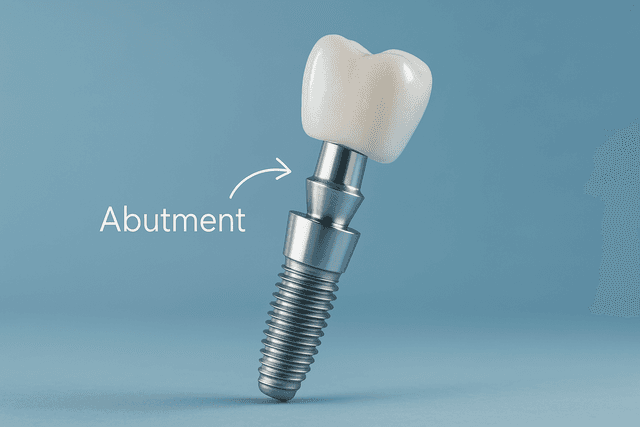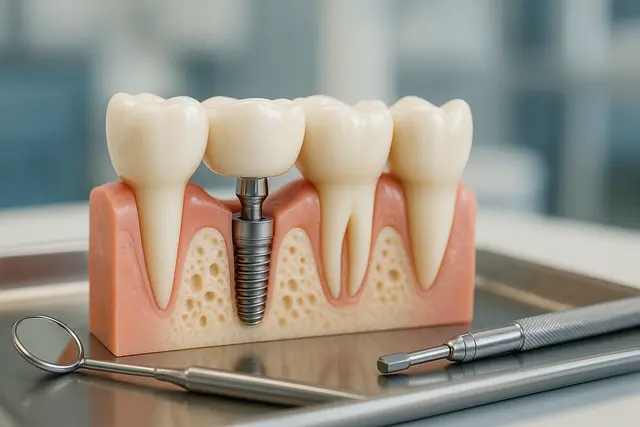Prosthodontics
5 min read
Mar 28, 2025
Dental Implants After Gum Disease: Is It Possible?
Gum disease affects the tissues that support your teeth. If left untreated, it can lead to tooth loss and bone deterioration. Many people who have lost teeth due to gum disease consider dental implants as a replacement. However, gum disease can weaken the jawbone, which may affect the success of an implant.

So, you’ve had gum disease. Maybe it was caught early and treated fast, or maybe it got a little wild and cost you a tooth (or more). Now you're wondering: Can I still get dental implants? Fair question, and honestly, one we hear all the time. The short answer? Yes, it’s possible. But there’s a “but” coming, and it matters. Let’s break this down the way your dentist probably would if they had more time and a cup of coffee in hand.
Let’s Talk Gum Disease (Because It Doesn’t Just Go Away)
Gum disease is a lot more than sore gums and bad breath. It creeps in quietly, maybe some bleeding here, a little swelling there, and before you know it, you’re Googling things like “what is periodontitis?” It starts as gingivitis, which is basically inflamed gum tissue. Leave it untreated and it can turn into something more serious called periodontitis, or periodontal disease. This is when the gums and bone that hold your teeth in place start to break down.
We’re not talking surface-level stuff here. Gum disease can lead to gum recession, bone loss, and yes, full-on tooth loss. So if you’ve lost teeth or had to deal with receding gums, you’re not alone, and it’s not the end of the road. But it does mean that replacing those teeth with implants takes a little more planning.
Dental Implants 101 (and Why They’re Worth It)
Dental implants are basically the gold standard of tooth replacement. They’re strong, permanent, and function like natural teeth. No slipping around like dentures. No clicking when you talk. Just you, smiling and eating like nothing ever happened.
But here’s the deal: for implants to work, your gums and jawbone need to be in decent shape. Why? Because the implant goes into the bone, just like a real tooth root. If your gum disease damaged the bone or gum tissue too much, the implant might not hold. It’s not about aesthetics at this point, it’s about stability.
This is where some folks may need a bone graft. It sounds intense, but it’s just a way of rebuilding the jawbone so it can support an implant. Same goes for gum grafting if your gums have pulled back too much. These extra steps don’t mean you can’t get implants, they just mean your mouth needs a little prep first.
Gum Disease and Dental Implants: The Real Relationship
So what happens when gum disease and dental implants cross paths? Well, if gum disease is still active, that’s a problem. You can’t just place an implant and hope for the best. Untreated gum disease can lead to something called peri-implantitis, which is basically gum disease around an implant. And trust me, that’s not a phrase you want to hear from your dentist.
That’s why getting your gum disease treated, and staying on top of it, is key. Once the disease is under control and the gums are healthy, you’re in a much better position to get dental implants that actually last.
Still have your doubts? That’s fair. Plenty of people wonder if they’re even a candidate for dental implants after dealing with all this. The truth? You might be, especially if you’re working closely with a dentist who knows what they’re doing and you’re committed to taking care of your oral health moving forward.
Can You Get Implants If You Have Gum Disease?
This might sound like we’re repeating ourselves, but let’s spell it out clearly: Yes, you can get implants if you’ve had gum disease, as long as the disease is treated and your gums and bone are healthy enough to support the implant.
That doesn’t mean you’ll automatically be ready for implant surgery the second your gum disease is handled. Some folks need a little more healing time. Others might need bone grafts. And some may need a full dental care plan with a few other dental treatments tossed in.
But it is possible. And if you’re missing teeth, or dealing with damaged teeth, getting implants can be a real game changer, not just for your smile, but for your confidence, your bite, and your overall health.
Your Dentist Isn’t Just Checking Boxes, They’re Building a Plan
If you’re even thinking about dental implants after gum disease, the first step is simple: book a consultation. Not a quick cleaning. Not a phone call. An actual sit-down with a dentist or periodontist who knows their stuff.
They’ll check the gum tissue surrounding the area, the bone structure underneath, and evaluate your oral hygiene habits. They might take some X-rays or scans. And they’ll be honest with you. If they say you need a bone graft or some extra care before you get dental implants, they’re not just trying to upsell you. They’re protecting the success of your implants.
This is where people go wrong, they rush the process. But if you take your time and follow your dentist’s treatment plan, the outcome is worth it.
Keep Your Mouth Happy (Because That Implant’s Not Going to Clean Itself)
You know what doesn’t get talked about enough? What happens after you get the implant. It’s not set-it-and-forget-it. Implants need the same love your natural teeth do, maybe even more. That means brushing, flossing, and yes, regular cleanings.
Poor oral hygiene is one of the biggest reasons dental implants fail. Don’t be that person. If you had gum disease once, you already know how quickly things can go south when you slack on your dental hygiene. Keep your gums and bone healthy, and your implant can last for decades.
Also, don’t skip cleanings just because your implant “doesn’t hurt.” Gums can look fine while a problem brews under the surface. Trust your dental team. They want your implants to last just as much as you do.
You’ve Got Options. Implants Are One of Them.
If you’re missing a tooth or two and don’t want to live the rest of your life dealing with dentures or hiding your smile, dental implants can be a fantastic option. Yes, gum disease can complicate things. But it doesn’t mean implants are off the table.
You’ll need healthy gums, enough bone, and a commitment to keeping your mouth clean. You might need a bone graft or other prep work. And you’ll definitely need a dentist who’s experienced with implant patients and gum disease cases.
But can it be done? Absolutely.
Final Thought (No Wrap-Up Speech Needed)
You’ve been through gum disease, maybe even tooth loss, and you’re still here, looking for solutions. That already says a lot. Dental implants aren’t just about fixing a smile. They’re about restoring your everyday life, how you eat, talk, laugh, and show up in the world.
If you’re ready to talk options, ask questions about gum disease, or just get clarity on whether implants are in your future, book that consultation. You might be closer than you think to getting a smile that feels like you again.
Can I Get Dental Implants If I’ve Had Gum Disease?
Yes, many people with a history of gum disease can still get dental implants, as long as the disease is fully treated and your gums and jawbone are healthy enough to support them. Your dentist may recommend additional steps like bone grafting or gum treatments to prepare your mouth for implant placement.
Why Is Healthy Gum Tissue Important for Dental Implants?
Dental implants rely on strong bone and healthy gum tissue to stay secure. If gum disease has caused significant bone loss or gum recession, it can compromise implant stability. That’s why treating gum disease and ensuring your mouth is healthy before surgery is essential for long-term implant success.
What Is Peri-Implantitis and Why Should I Be Concerned?
Peri-implantitis is a type of gum disease that affects the tissue around a dental implant. It can lead to inflammation, bone loss, and even implant failure. Patients with a history of gum disease are more prone to this condition, so maintaining excellent oral hygiene and regular dental check-ups is key after getting implants.
What Should I Expect During a Dental Implant Consultation After Gum Disease?
Your dentist will assess the health of your gums and bone using exams, X-rays, or 3D scans. They’ll look for signs of healing from past gum disease and determine whether additional procedures like bone grafting are needed. The goal is to create a personalized treatment plan that supports long-lasting implant success.
Read Next
Related Posts

Prosthodontics
Caring for Implant Supported Bridges: How to Keep Them Strong and Healthy
Caring for your implant-supported bridge is just as important as getting it placed. These restorations are designed to look, feel, and function like natural teeth, but they need consistent care to stay that way. With the right cleaning habits and maintenance routine, you can protect your investment and keep your smile strong and healthy for years.
5 min read
Oct 14, 2025

Prosthodontics
Implant Abutment Explained: What It Is and Why It Matters
Dental implants have revolutionized the way we restore missing teeth, but there's more to them than just the visible crown. One often-overlooked component, the implant abutment, plays a crucial role in both the function and appearance of the final result. Understanding what it is and why it matters can make all the difference in your implant journey.
4 min read
Oct 10, 2025

Prosthodontics
Pros and Cons of Implant Retained Bridges: A Simple, Honest Overview
Missing teeth can affect more than just your smile, they can impact your confidence, speech, and even how you eat. With so many options out there, it’s easy to feel lost in dental jargon and marketing buzzwords. That’s why we’re breaking down implant retained bridges in plain English, highlighting the pros and cons so you can make an informed choice without the fluff.
6 min read
Oct 10, 2025
Don’t have time to research every dentist around you?
See why 30k+ patients trusted us